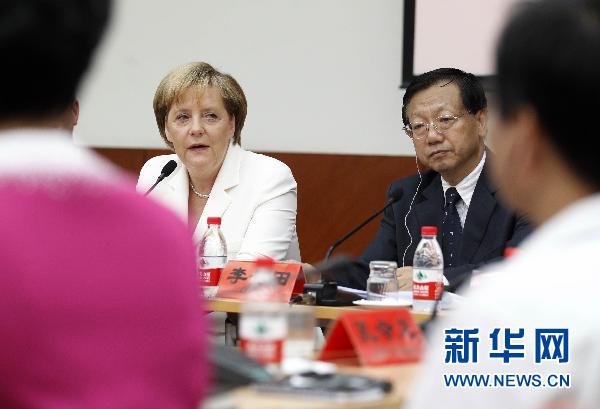Inside the Central Party School
 |
|
German Chancellor Angela Merkel talks with the students of the Central Party School in Beijing in 2010. [File photo] |
A more opening-up Central Party School
Jin Wei came to work at the Central Party School in 1985.
At that time, the school was classified as a confidential unit and could neither be found on a map nor through an information directory desk.
However, its door has been gradually opened along with the changing times. Officials studying here can now have the opportunities to learn more about other countries.
At the end of the 1990s, the Central Party School entered into cooperation with many foreign research institutes and universities. Overseas study tours have become an important part of the school curriculum.
He Qinhua, President of East China University of Political Science and Law, attended the school's Young and Middle-aged Cadres Class in 2001. He was sent to Singapore in the latter part of his study and was received by the then Prime Minister of Singapore Lee Kuan Yew. During the tour, they also visited the city-state's parliament and watched the activities on the weekly reception day hosted by members of the parliament.
The school also began to invite foreign scholars to give lectures when Hu Jintao served as its president (from 1992 to 2002).
In June, 2005, Peter Piot, Executive Director of UNAIDS (the Joint United Nations Program on HIV/AIDS) and Under Secretary-General of the United Nations, gave a speech on AIDS prevention in the school. Vice President of the Party School Li Junru and former Vice Minister of Health Wang Longde were present at Piot's speech.
Before he came to China, Piot contacted Professor Jin Wei through the UNAIDS China Office, expressing his hope to give a speech in the Central Party School. The request got final approval after being reported to superior Party levels.
However, even now it is still not an easy thing for political figures and scholars to give lectures at the school.
In foreigners' eyes, the school seems endowed with some special power; and even in the eyes of officials from central ministries and commissions, a lecture in the Central Party School works better than several national telephone conferences in fulfilling a mandate.
Every Friday morning, a lecture attended by all registered students is held. Using this venue, State leaders and officials from central ministries and commissions brief the attendees on domestic and international situations and at the same time garner understanding and support from them.
Apart from government officials, entrepreneurs have also shown enthusiasm in attending this prestigious school. Since the 2002 Sixteenth National Congress of the CPC, the school's education and training center has been open to private entrepreneurs.
A private entrepreneur told Nanfang Weekend that it makes a great difference between getting an MBA degree at Peking or Tsinghua universities versus studying at the Central Party School, with the latter being apparently preferred.
 0
0 






